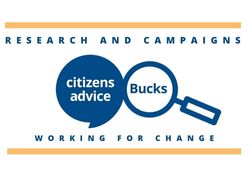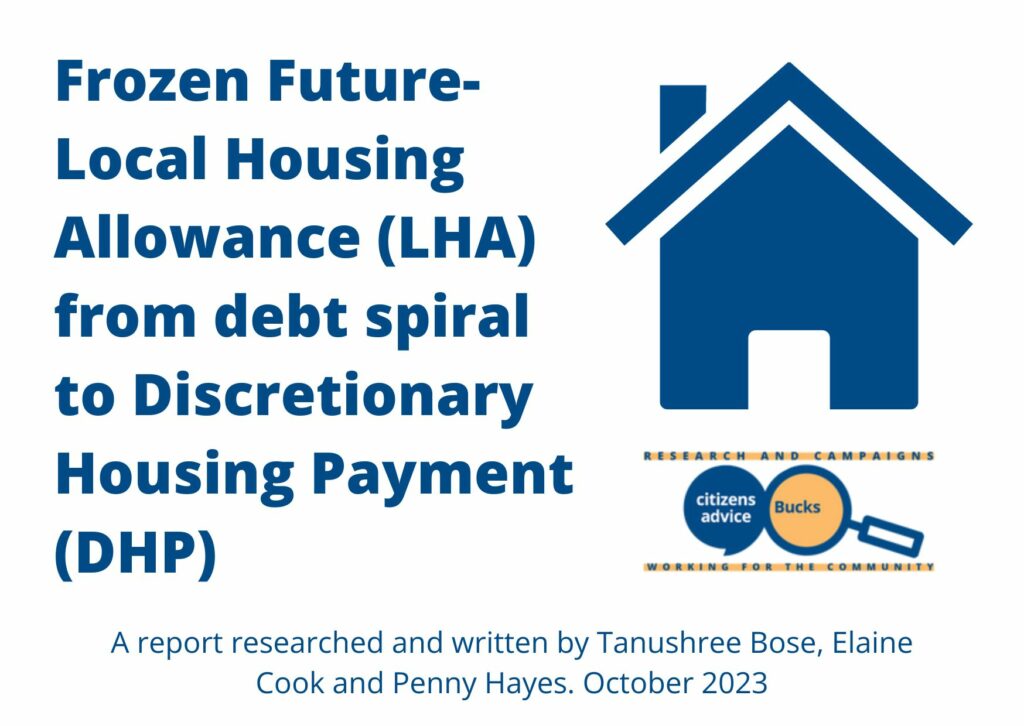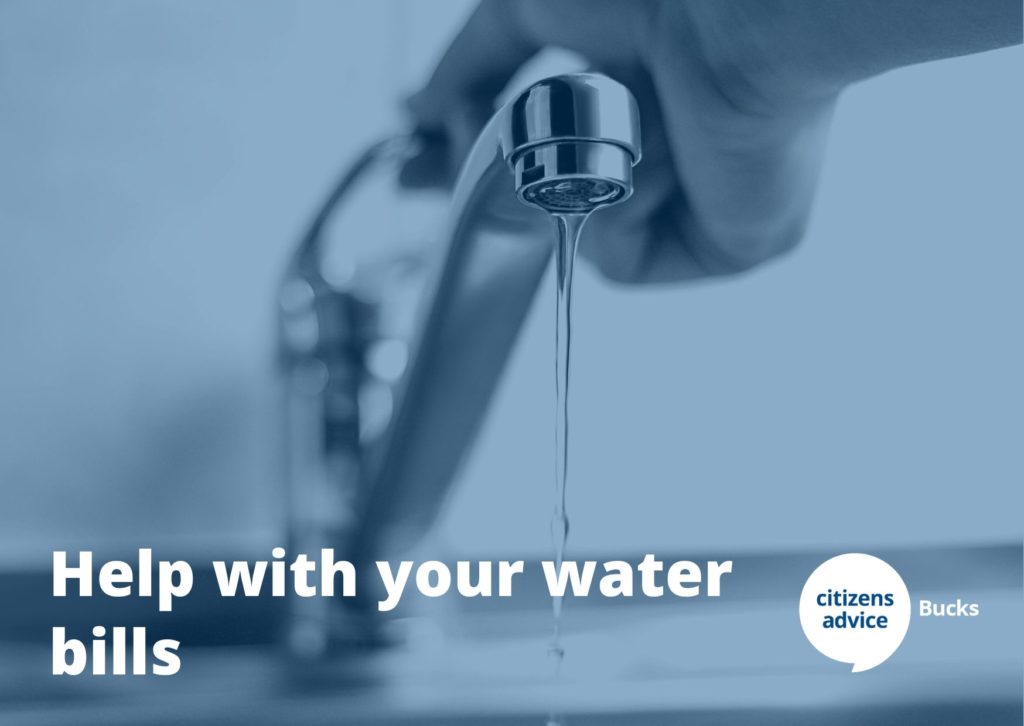
Frozen Futures- our new housing report

Our Research and Campaigns taskforce at Citizens Advice Bucks have just release our new report looking at Bucks housing crisis and the drop and freeze of LHA rates in the county.
You can read the full report here:
What is Research and Campaigns?
Here at Citizens Advice Bucks, we are in a unique position to gather and analyse a huge amount of insight and data about the problems facing our clients in Buckinghamshire. This means that we can really see what issues are faced by our community, as individuals and as a whole.
We use this insight and data to do several things:
- To help us research issues further
- To influence decision makers to change policies and practices
- To campaign to get decision makers to change policies and practices
- To really work towards a better life for those in our community

We have our very own Research and Campaigns team here at Citizens Advice Bucks because it is important to us not only to help those who we directly support, but also everyone else in the wider community who locally may be facing similar problems but who have not come to us. By collecting evidence, looking for frequent disparities and capturing a voice to go with the data we can look to make positive changes. We can use our clients’ words, backed up with the quantitative data to analyse, inform and progress. We can show the impact of an unjust or unfair local policy and do our best as a lobbying charity to help prevent similar injustices from happening in Bucks in the future.
Research and Campaigns work in Bucks
- Safe homeless accommodation in Bucks
- More flexibility in Bucks Home Choice
- Assurance that critical functions will continue while Bucks Council migrates IT systems
- Asking for simpler processes for Citizens Advice to engage with a enforcement agents
- Ensuring accurate calculations of Council Tax Reduction
- Ofgem – asking if gas companies can help customers who are cut off because their prepayment meters don’t have sufficient credit for their annual boiler inspections
- Courts – asking for letters to carry an actual date rather than “date as postmark”
- Department of Work and Pensions – representing Bucks clients’ interests with DWP
- Saving money on your water bill – ties in with Paradigm moving away from collecting water charges for Affinity Water
- Safe renting
- Better information on Council Tax Reduction for the Chiltern region
- Worked with Paradigm to ensure that customers from whom they collected charges on behalf of Affinity Water could get access to the full range of services and benefits offered by Affinity Water

As well as our local research and campaigns work in Bucks we directly contribute and support our colleagues at National Citizens Advice. We do this by providing evidence from our clients’ issues on subjects such as Debt etc. For example, National Citizens Advice is looking at the problems caused in using Buy Now Pay Later products that, for some, can cause financial hardship.
National Policy Campaigns
This campaign relates to policy or practice in England and Wales.
Citizens Advice helped over 400,000 people with Universal Credit last year. Our clients’ evidence helps us play a key role in influencing the Government to ensure the welfare system works for all those needing support.
Why things need to change
The Covid-19 pandemic sent economic shockwaves up and down the country and millions of families turned to the benefit system for financial support. However, Universal Credit was able to adapt quickly, providing a much-needed safety net for those in need.
Yet, the biggest challenge is still to come. The labour market has endured a seismic shift and the ballooning cost of living threatens to cast a long shadow over our recovery. In the coming months and years, Universal Credit needs to continue to adapt to provide financial support for those who need it.
What we’re asking for
Last year, we welcomed changes to Universal Credit which meant that working people can keep more of what they earn. This represented a significant investment in the benefits system which will help some working families cover their essential costs.
However, following a £20-a-week cut to Universal Credit in October and the scale of the emerging cost of living crisis, we need to look at how the benefit system can better support people to cover their basic needs, such as heating their home, or putting food on the table.
Moreover, Universal Credit can sometimes feel like a one-size-fits-all model – the rules in the system are far too rigid to provide effective support for people with varied needs which sometimes works against its own objectives.
For example, Universal Credit intends to help people into work, but the rule that requires claimants to pay their childcare costs upfront can make it harder for some parents to enter employment. We’re asking for Universal Credit to cover childcare payments upfront to help to remove barriers to work for parents.
Tackling climate change is one of the most pressing challenges facing societies today. Every single household in the UK will need to make low-carbon changes to their homes in order to achieve the government’s climate targets, yet the process of making these home improvements is currently too complicated.
We’re asking the government to put consumers at the heart of plans to reach net zero. Without public understanding of why changes to homes are needed, information to help people make decisions, and support if things go wrong, public faith will be undermined. This will put our ability to reach net zero at risk.
Why things need to change
In 2019, the UK committed to end its contribution to global warming by pledging to reach net zero carbon emissions by 2050. Big changes will need to take place across society for us to reach this target, including a drastic change in how people heat their homes.
Low carbon heating systems such as heat pumps, biomass boilers and heat networks will need to be installed in 29 million homes in the UK if we are to reach the net zero target – a monumental task.
As the statutory consumer champion in the energy market, Citizens Advice has a unique insight into the problems facing energy consumers across the country from the people who contact our advice service every day. Our research shows that people want to help reach net zero, but often don’t know what they need to change or how to go about it. They’re even less likely to do it if it feels complicated or if they hear horror stories of things going wrong.
It’s a confusing consumer landscape for anyone wanting to install low-carbon technologies in their home right now. The market is difficult to navigate and gives too many opportunities for things to go wrong. Consumers are left vulnerable to scammers and rogue traders and are unable to seek redress when problems occur.
What we’re asking for
29 million homes need to be upgraded. People shouldn’t have to be climate experts to understand the changes required.
We’re asking the Government to:
- invest in high quality information and advice
- establish a single consumer protection scheme for low-carbon home technologies and installations to support people if things go wrong
- support people to access the right financial support
What we’re saying
Read our latest report:
- Citizens Advice joint letter to the Prime Minister on the Net Zero Strategy
- Navigating net zero: A framework to give people the confidence to invest in home energy technologies
- Home truths: The challenge and experience of making home energy improvements
- Zero Sum: How to prioritise consumer protections to ensure nobody is left behind on the path to net zero
From August – December 2021, 4 million households in the UK saw their energy company go bust. Citizens Advice, as the statutory energy consumer advocate, worked at the forefront of this volatility in the energy market to protect consumers as suppliers failed. We estimate that supplier failures since August 2021 will result in a multi-billion pound bill for consumers.
This was a preventable crisis. The energy regulator Ofgem allowed unfit energy companies to trade with little penalty. Despite knowing about widespread problems in the market, Ofgem failed to act, leaving companies exposed to this year’s spike in wholesale prices. These mistakes contributed to the collapse of 28 firms in total in 2021.
Urgent changes are needed to fix the problems that led us here and restore trust in this essential service. Rules and enforcement needs to be rebalanced in favour of consumers to ensure this never happens again.
Why things need to change
From 2010 onwards, dozens of companies entered the market with limited checks. Some offered good service to consumers, but others were poorly prepared. Despite warnings from Citizens Advice and others, it was only in 2019 that Ofgem brought in new rules on market entry, and in 2021 to improve financial resilience – reforms that came far too slow to prevent the collapse we’ve seen. Ofgem’s regulatory failings also led to a culture where companies were free to flout the rules.
What we’re asking for
Ofgem and the Government must act to fix the problems that led us here and restore consumer confidence in the market:
- There should be an independent review of the causes of the market turmoil which considers the role of delays in policy changes, Ofgem’s approach to compliance and enforcement, and recommends improvements.
- Ofgem should introduce a new consumer duty, similar to that being introduced in financial services, which would put the onus on companies to ensure good consumer outcomes in future.
- Consumers should be protected from immediate bill hikes resulting from recent supplier failures
- Ofgem and the Government should develop clear strategies for the retail market and its role in supporting decarbonisation. These should consider how to enable consumer engagement and innovation in a more consolidated market.
What we’re saying
No Recourse to Public Funds is a condition attached to work, family and study visas which restricts access to much of the welfare safety net for almost 1.4 million people, including around 175,000 children. This includes vital benefits like Universal Credit and child benefit and a range of other support like homelessness assistance or access to refuges that rely on public funds to operate.
Why things need to change
New Citizens Advice research reveals some of the heart-breaking challenges people with NRPF face with little or no help from the benefits system. Many have been pushed into crisis by the pandemic, others struggle with low pay or insecure work.
- People with NRPF are four times more likely to be behind on at least one essential bill (81% against 20% for the UK population) with rent, utilities and council tax the most common bills missed.
- Almost half (48%) report living in overcrowded accommodation and 1 in 5 (18%) have experienced homelessness or housing insecurity.
- Three-quarters (75%) have suffered from at least one negative consequence of having NRPF, including not being able to feed themselves or their family, or afford clothing and footwear appropriate for the weather.
- 1 in 4 (23%) already can’t afford to heat their homes. With big price rises now kicking in for fuel bills, many more are likely to face impossible choices this winter.
The research also shows that people with NRPF are finding it hard to recover from the economic impacts of the pandemic. Rates of part-time and insecure work have both increased and a huge majority of people with NRPF (79%) are earning less now than before the pandemic.
What we’re asking for
Citizens Advice is asking the government to provide people building their lives in the UK with access to the welfare safety net, by removing the NRPF condition for those who are habitually resident here.
What we’re saying
Read our latest report:
‘Financial quicksand’ is our term for online spending that’s too easy to slip into and too difficult to get out of – a worrying trend we’re seeing emerge across multiple markets.
Examples include:
- Buy Now Pay Later (BNPL) products, where consumers can find themselves entering into credit agreements without realising or fully understanding what they’re signing up for
- Online gambling, where most gamblers estimate to takes only a matter of minutes to create an account, and protections are often difficult to access
- Subscription services, which often tempt you in with a free trial that requires one-or-two clicks to enter, but is harder to cancel.
You can read more about financial quicksand in our blog ‘Financial quicksand is popping up everywhere – what is it? And why should we be concerned?’
Why things need to change
Buy Now Pay Later (BNPL):
By offering to split and delay payments at checkout, BNPL products allow people to enter into credit agreements in seconds and take out numerous products with different providers.
While this will be useful for some, for many it can pose new and serious risks to their finances. Our research shows:
- BNPL users were charged a total of £39 million in late fees, and more than 1 in 4 people regretted using BNPL
- 2 in 5 BNPL users struggled to meet a repayment, and 1 in 3 missed or made a late payment
- BNPL creates new and different risks for consumers than other credit products: 39% of people used BNPL without realising, and 42% didn’t fully understand what they were signing up for
Gambling:
Online gambling products are designed in a way that makes it hard for people to stay in control. Often, it’s far easier to create an account than it is to close one, while one-click deposits, prompts to increase bets and barriers to withdrawing money can contribute to this lack of control. Our research shows that 3.3 million people are in gambling debt, with the average value of gambling debt estimated to be £10,000.
- 44% of online gamblers said their gambling has increased since the pandemic began
- 57% of people in gambling debt said their debt increased during the pandemic
- 1 in 5 online gamblers regret gambling either every time they do it or most of the time
Those who do access gambling controls, such as ‘time spent reminders’ and deposit limits, found them highly effective. While only 10% of online gamblers are making use of these, of those who have, over 70% said they were effective in helping them stay in control of their gambling.
What we’re asking for
To tackle these rapidly evolving online markets, equally creative and nimble regulation is needed.
Buy Now Pay Later (BNPL):
The Treasury has opened a consultation into the rapidly-growing BNPL market, which we will be responding to. As the sector continues to expand across new markets and into new retailers – being used to buy white goods, electronics and even food – it’s essential that regulation addresses the new risks created by this shift in how we spend, and the considerable problems we’re seeing already.
Gambling:
We’d like to see these gambling controls expanded and put in place by default, with gamblers given the choice to opt-out, rather than opt-in.
The Government has committed to bringing forward a White Paper on gambling regulation in the coming months.
What we’re saying
Ensuring post offices can support resilient communities
Post offices can play a vital role in sustaining dynamic and resilient local communities. As the largest-remaining universal face to face service provider, the post office network is relied upon to fill the gaps left by bank branch closures and ensure vulnerable people can access digital only services.
Why things need to change
In the last 3 years the number of people using post offices for banking services has doubled, including 1 in 5 local businesses. As services have shifted online, the post office has served as a lifeline for people in rural areas or people who aren’t able to use the internet. During lockdown, the post office network stepped up to ensure these people could still pay bills, access cash and other essential services. As many retailers leave the high street due to the financial impact of coronavirus, its role looks set to increase.
Since 2013, the number of temporarily closed post offices has doubled and an increasing number of rural communities now rely on outreach services that are open on average just 7 hours a week.
What we are asking for
We would like government to commit to further funding so that the post office network is well-funded into the future and can effectively serve all communities in the UK.
Protecting and strengthening postal regulation
Ofcom is conducting a review of postal regulation. This review will determine the future of the rules that govern the provision of essential services in the postal market -including the Universal Service Obligation, the safety net that keeps post fair and affordable for everyone.
We will work to ensure that any changes to the regulatory framework are made in response to consumers’ needs.
Why things need to change
Our recent work has highlighted that parcel delivery is now an essential service. According to Ofcom, nearly 2.6 billion items were delivered to households across the UK in 2018-19 – an increase of 10% on the previous year. Volumes have continued to increase dramatically as physical shops were closed during Covid-19 lockdowns and people shopped online and had goods delivered. Office for National Statistics figures reveal that, in June 2020, people in Great Britain spent almost £2.5 billion per week online, almost a billion pounds more than in January 2020.
But parcel delivery doesn’t work well for consumers. In 2019, we found that 6 in 10 consumers experience significant problems with parcel delivery. Large spikes in visits to our parcels online advice pages during lockdowns supports our previous findings that problems increase with parcel volumes as set out in our report on Trends in the postal service market and work on next day delivery.
In addition post has kept communities connected throughout national and regional lockdowns this year. People are using post to keep in touch with loved ones and receive vital information. But, not everyone can access their post in the same way. Our Millions without mail report showed that 7 million people haven’t been able to receive their letters at some point in the last decade. These people face significant harm as a result, like missing out on health care services, benefits, housing and employment opportunities. It’s also resulted in financial loss and debt. This problem disproportionately affects marginalised people such as survivors of domestic abuse, homeless people and members of the Gypsy and Traveller community.
What we are asking for
We are calling for Ofcom to improve the parcel delivery market so it can achieve better consumer outcomes through its regulatory review process.
We’re asking the government to invest in an Address & Collect service provided at post offices to provide equal access to post for those in unsafe or precarious living situations.

National Awareness Campaigns
In response to the issues with the energy market in 2021/22 Citizens Advice and the Energy Saving Trust are sharing information and advice to help people manage their energy bills this winter. Throughout this campaign we will deliver key energy advice to clients across England and Wales, helping them save money while keeping warm this winter, and reassuring them that Citizens Advice is here to provide support in the coming months.
Our annual Scams Awareness campaign aims to create a network of confident, alert consumers who know what to do when they spot a scam. This year’s campaign took place 13 – 26 June.
If you’re looking for advice and support on scams please visit our online advice pages.
National Consumer Week is an annual campaign which aims to raise people’s awareness of specific consumer issues, and provide support and advice for those who need it. The 2021 campaign took place 6 – 12 December.
National Consumer Week 2021 encouraged people to “be wise to being green”. It’s important that we take steps to be more environmentally friendly, like making our homes more energy efficient and installing energy technologies like solar panels. It can save money in the long run, and it’s good for the environment. It’s also an important part of how we can meet our UK climate change target.
But it’s also important that people feel confident when they’re making these decisions.
That’s why we were raising awareness of how people can protect themselves from misleading energy efficiency and environmental claims, such as “green scams” and rogue traders. With our advice and support consumers can arm themselves with the knowledge and confidence they need to make the best decisions.





